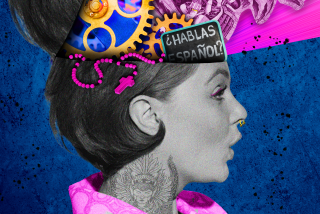Shifting realities
By Ed Park
Repetition is never a good thing. In “Tlön, Uqbar, Orbis Tertius,” Jorge Luis Borges cites or invents a Gnostic saying. “Copulation and mirrors are abominable,” he writes, because both reproduce the visual universe, which is illusory. People balk at cloning because identity is sacred, the only thing everyone can claim as his or her own. Per Walter Benjamin, art loses its aura in the age of mechanical reproduction. Déjà vu unsettles us. Plagiarism is for the dishonest and lazy: Better to craft your own sentences, leave your distinctive mark, even if you’re in total agreement with some prior sage. The original is always better than the copy. We want people, things, thoughts, experiences to be one of a kind.
Except, of course, we don’t. We watch “Seinfeld” reruns, read and reread books by Agatha Christie (or Borges), pay regular visits to a favorite restaurant, check the same news sites every morning. Repetition fulfills a human need for order. We want to evoke happy memories, re-create certain good feelings -- or at least extend the feeling that we wield some control over our own little patch of the world.
In the graphic novel “Apollo’s Song” (Vertical: 542 pp., $19.95), by the late manga virtuoso Osamu Tezuka, repetition is punishment: A sadistic man-child named Shogo is being reprogrammed to learn how to love. His peculiar form of therapy involves vivid hallucinations, implanted by shock treatment and hypnosis, in which he vividly loves and loses the same wide-eyed sylph over and over. The paradox is that what’s essentially the same story, filtered through various historic and fantastic milieus, not only holds our interest but also sparks a satisfaction deeper than the sum of its episodes. We know what’s going to happen, but Tezuka’s shamelessly entertaining storytelling and versatile art make repetition a giddy and even profound pleasure.
Two years ago, Vertical finished bringing out an English translation of Tezuka’s “Buddha,” an improbable page turner (in eight volumes) that freely deviates from the facts of its subject’s biography, leavening the spirituality with ripping yarns, postmodern boundary violations and plain old silliness. Originally published in 1970, “Apollo’s Song” is another opus of eternal recurrence, and a more challenging one: Shogo, who appears on virtually every page, is a violent misanthrope with a nasty Oedipal complex. Indeed, in anti-Gautama fashion, he’s brought into a psychiatric institute because of his penchant for cruelly killing animals.
Although the book takes its cue from Greek myth (the title refers to Apollo’s doomed pursuit of Daphne), its worldview is Buddhist, and it can be seen as a curtain-raiser for “Buddha,” which Tezuka would commence in 1974. “Apollo’s Song” begins with full-frontal nudity: an eye-defying sequence featuring a million men, a strangely unclad army, rushing toward a single woman -- they are sperm, she is an egg. Their union is “the mark of love, truth, and sincerity between man and woman,” which gets sundered as the fetus gains its own sex -- thus creating conflict in utero, a different kind of original sin.
After the third episode (in which an ex-marathon runner takes Shogo under his wing -- don’t ask), the character finds himself in a Tokyo monitored by robo-police and dominated by human-hating Synthians. It’s 2030, and the world is drained of love. Synthian scientists have perfected cloning and prosthetics; downtown is literally a cemetery. (Depicted in a stunning wordless panel, the tombstones recall the mass of naked men.) Revolutionaries tell Shogo he’s one of them, on a mission to kill the Synthian queen. Of course, she is just another iteration of the woman he is fated to lose, and in another inversion of the million man army, they declare their mutual passion as their enemies blast away at her endless clones, each one pouring her heart out to him before hitting the ground. Repetition is nightmare, but it is also love.
*****
“It is like falling through many trapdoors, looking for the one room whose floor is not hinged,” muses the narrator of “Sundance,” a typically mind-bending tale in “To the Dark Star 1962-69” (Subterranean Press: 392 pp., $35), the second of eight projected volumes in “The Collected Stories of Robert Silverberg.” One of three narrators, you could say -- except that all three voices belong to the same character, Tom Two Ribbons, a Native American who is either unhappily employed in the extermination of an alien species or is in a hallucinatory form of therapy to work out his rage at the mistreatment of his people by the white man, or some combination of the two.
Tom could be describing the shifting realities of “Apollo’s Song.” (Indeed, Shogo literally exits one narrative via trapdoor.) Silverberg’s short fiction from the 1960s shares many obsessions with Tezuka’s manga -- madness and control, paranoia and technology and, yes, the peculiar anxiety of repetition. The result is an unusually satisfying collection, less a grab bag than a dizzying refraction of creative energy.
Repetition comes in many forms here: lives relived, cells regrown, mass reproduction (resulting in the monstrous multiplication of city-sized apartment buildings). “Ringing the Changes” and “Halfway House” inventively imagine an intersection of multiverses that serve as a de facto hospital, since in at least one of these infinite realities, a cure for cancer has been found.
Almost as much fun as the stories are the anecdotal introductions that Silverberg provides for each. Part of the charm is that he’s not even remotely modest: One story initiated “a long string of appearances in year’s best anthologies for me”; the late ‘60s saw an “explosion of my abilities.” The author considers the collection’s first story, “To See the Invisible Man” -- in which a marked criminal endures the worst agony by simply being ignored by society -- to be the start of his “real career” as a science-fiction writer. (The germ, he notes, came from a line in Borges.)
He’s also garrulous about his friendly, if occasionally heated, relationships with editors, including Frederick Pohl, who extended an amazing offer to run anything Silverberg wrote. (Pohl did offer some testy criticism once: “Please, Bob, leave this Existentialist despair to Sartre and Philip K. Dick. It bores the readers stiff, and it doesn’t do much for this particular editor, either.”) “Passengers” went through five arduous edits with Damon Knight. (In the final round, he pleaded for Silverberg to “put the love” into the love story.) The result is an amnesia-Capgras conceit, in which people get taken over by malicious “riders” and act unconsciously, not to mention unconscionably. “So would it have given my rider a kind of delight to find me a woman and force me to fail repeatedly with her?” the narrator wonders, waking in his messy bed and wondering how his evening had gone. In this memory-free zone, repetition turns both depravity and humiliation into the same kind of horror.
Ed Park is a founding editor of the Believer. Astral Weeks appears monthly at latimes.com/books.
More to Read
Sign up for our L.A. Times Plants newsletter
At the start of each month, get a roundup of upcoming plant-related activities and events in Southern California, along with links to tips and articles you may have missed.
You may occasionally receive promotional content from the Los Angeles Times.






